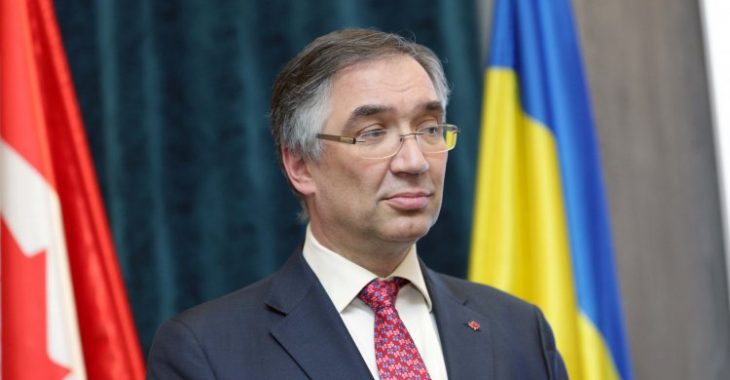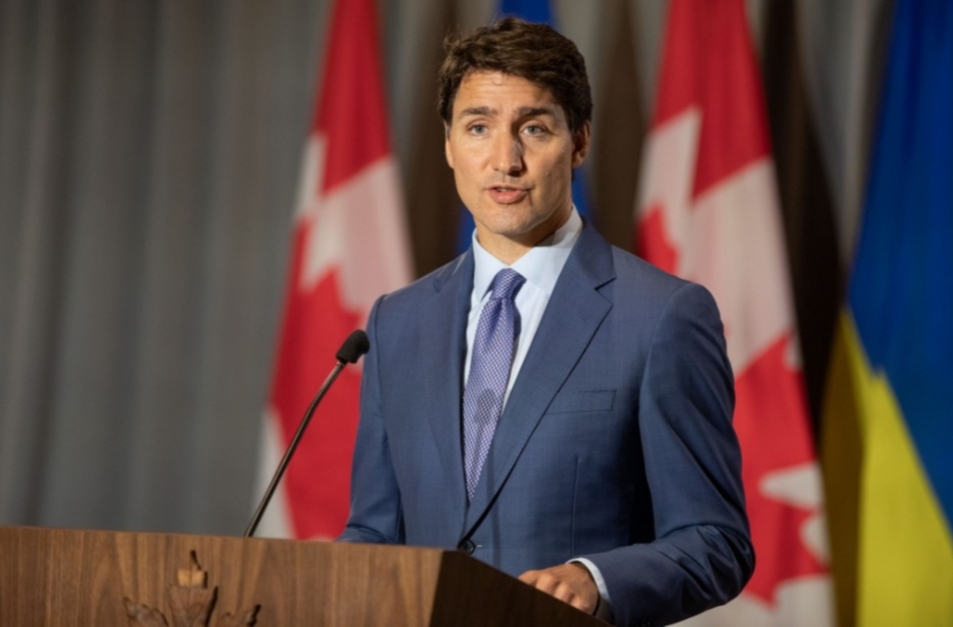On 23 September, the Ukrainian parliament passed law №5599 on de-oligarchization. It sets criteria for determining who oligarchs are and how the state can limit their influence.
The presidential team argues that this will limit oligarchic influence. The opposition, on the other hand, claims the law neither changes the system nor puts an end to oligarchic monopolies. Further, it strengthens presidential control over business, giving the president additional power to determine who is an oligarch.
De-oligarchization was one of the promises driving Zelenskyy’s election campaign. His February sanctions against the country’s main pro-Russian oligarch Victor Medvedchuk kept up the earlier falling presidential approval ratings. But the new law has sparked debates.
Here are the details of the law and arguments of both sides.
State officials must now report if they contacted with oligarchs from public list
The full title of the law says it is the law on “Preventing threats to national security caused by the excessive influence of individuals who have significant economic and political weight in public life (oligarchs).”
Such a title reflects the main issue of the law: who determines who is an oligarch and what is the excessive influence? The law gives this power to the National Security and Defense Council (RNBO), controlled by the president.
According to the law, its main objective is to prevent “the merging of politicians, media and big business.” Subsequently, a person is defined as oligarch if they meet at least three of the four following criteria set by the law:
- participates in political life
- has a significant impact on the media
- is the owner of an economic entity, which is a natural monopoly or occupies a dominant position in the market
- owns assets worth UAH 2.4 billion ($90 million) and more.
Given that the criteria are quite wide and only superficially specified in the law, the president in many cases can subjectively define whether anyone amongst the big Ukrainian entrepreneurs is or is not an oligarch.
Based on the decisions of the RNBO, oligarchs are listed on a specially drafted public list which includes information about their assets, companies and media they own, as well as political parties or candidates which were supported by oligarch money.
Entering the list, a newly-defined oligarch faces several limitations such as:
- financially supporting political parties or candidates that run for the elections.
- being a purchaser of state assets during the big privatization campaign (big privatization is an ongoing policy when the state sells its enterprises or other assets worth $10 million and more).
- financing any political activity, financially supporting political rallies.
The last important provision of the law is the declaration of contacts. All state officials should publicly declare if they have had contacts with oligarchs from the list or representatives of oligarchic companies. Failing to report means that officials are subjected to dismissal, be they in top state departments such as head of security service, prosecutor general or regular employees.
Along with presidential party, some oppositional MPs supported the law as a small step in the right direction
Volodymyr Zelenskyy praised the adoption of the law that he himself initiated:
“Thanks to the anti-oligarchic law, Ukraine gets a historic chance to build a civilized and clean relationship between big business and the state… There will no longer be an oligarchic branch of power in Ukraine. Legislative, executive and judicial – yes. And for the oligarchs, the only way is to become a clean business.”
Zelenskyy’s advisor Tymofiy Mylovanov elaborated more on the benefits of the law, which are basic concepts and criteria determining how a businessman can be recognized as an oligarch as well as restriction on oligarchs’ contacts with politicians and officials.
He recognized that success depends on the proper implementation of the law and also stated that many countries have much stronger restrictions on big business and lobby, for example the USA:
“Every six months I [as a company in the USA] have to submit a report in which I have to describe not only who I talked to [members of Congress], but also what I talked about, and how much my company can earn if a lobbied law is implemented. Such a declaration is a slightly different form, but exists in many countries.“
Several opposition MPs, including 11 from the Voice (Holos) party, also supported the law. As Oleksandra Ustinova, an MP formerly from Voice wrote, the law is populist and declarative, it should be supported by anti-trust laws and effective work of the Antitrust Committee. Nonetheless, it is a small step in the right direction:
“Our position remains unchanged: to effectively fight the oligarchs, it is necessary to improve anti-trust legislation, reform the courts and law enforcement agencies, and increase taxes on oligarchs… But this law can be a problem for our oligarchs abroad, because getting into the register of ‘oligarchs’ will be noticed by regulatory authorities and banks in foreign countries. This law, if properly implemented, will reduce the influence of oligarchs on politics, as they will be prohibited from making contributions to political parties. This law, if properly implemented, will not allow the oligarchs to buy assets during large-scale privatization.”
Ukraine eyes a second Big Privatization of state enterprises. The oligarchs are eyeing it, too
“Oligarchic MPs voted for this anti-oligarch law,” excessive presidential functions, and other criticism from opposition
MP Volodymyr Ariev from Poroshenko’s European Solidarity says that the law allows Zelenskyy to put pressure on political opponents. The law was also supported by MPs linked to oligarchs which means it is a smokescreen rather than a real fight.
“Oligarchic MPs voted for this law, which is [supposedly] against oligarchs. Real oligarchs don’t care about this law. It is written so that Zelenskyy himself determines who is an oligarch and who is not. It gives Zelenskyy excessive political power… De facto, Zelenskyy can define any wealthy person as an ‘oligarch’ and remove him from the political process.”
Along with MPs from the presidential party Servant of the People, the law was supported by groups of MPs from Сredence and For the Future, the main groups of MPs associated with oligarchs and lobbyists.
For the Future is closely linked to oligarch Ihor Kolomoyskyi and unites MPs who themselves own big businesses. If they have supported the law, it means they are not against this kind of “deoligarchization.”

There are fears that the law will allow Zelenskyy to put pressure on business and consolidate his power. That was expressed in a statement by the Voice party.
Director of the Institute of World Politics think tank Yevhen Mahda further elaborated on the topic, claiming that anyone with assets of more than $90 million can be declared an oligarch, and in Ukraine there are several thousand such people.
He particularly emphasizes that the law can be directed against Petro Poroshenko who is rich, popular, and has his own media, fitting into the definition in the law.
Negative comments on the law reach as far as the comparison between Zelenskyy and Putin. Liudmyla Buymister, the only MP from the Servant of the People party who voted against the law, said in an interview that similar process of so-called de-oligarchization happened in the Russian Federation in the early 2000s, when the Yukos case first began, and then Russian oligarchs Khodorkovsky, Berezovsky and Gusinsky encountered harassment for the positions expressed by their media resources. The FSB received new powers to carry out media censorship in Russia.
Although the comparison seems to be overdone, the truth behind it is that oligarchic pluralism actually helped to secure democracy in Ukraine, unlike in Russia or Belarus where presidents are the only oligarchs at the same time. Ukrainian oligarchs, competing with each other, allow smaller players to play their own game as well as achieve only limited influence over state institutions.
The post-Soviet oligarchy and how it shaped national state politics | 30 Years of Freedom, p.2
Oligarchic system like feudalism – mere fight against some landlords doesn’t bring systemic changes
As Valeriy Pekar, a political analyst at the Kyiv-Mohyla Business School, claims, it is necessary not so much to fight individual oligarchs, but the system which allows oligarchic and corrupt relations and policies. First of all, it requires antitrust policy and transparency in the management of state-owned companies.
Pekar compares the oligarchic system to feudalism, claiming that rent of privileges should be replaced by the rent of capital:
“The oligarchs are the profiteers in the rent of privileges: that is, in essence not the capitalists who live on the rent of capital, but the feudal lords. Privileges in an oligarchic system are diverse: a monopoly position in the market, access to privatization and procurement, to court decisions, licenses and permits, to special tariffs, benefits and subsidies, or simply to the ‘window at the border.’”
He also outlines ten policies that could really turn Ukrainian oligarchs into ordinary big entrepreneurs, criticizing the president’s law as populist and useless. The policies, among others, include:
- an antitrust policy, because the monopoly position allows the oligarchs to transfer money from the state budget and from citizens.
- privatization and transparent corporate governance of state property, so that oligarchs cannot use it for their personal benefit.
- development of independent media that can balance the influence of oligarchs on the voters.
- deregulation of economic processes, increase of economic freedom so that competition to oligarchs grows.
Legal adviser and anti-corruption expert Maksym Kostetskyi predicts that the hotly discussed law on oligarchs will in fact have neither a significantly negative nor a noticeably positive impact.
“The real recovery of the country and the transformation of oligarchs into big but ordinary businessmen is antitrust, judicial and law enforcement reforms. This is well-understood by both the government and the opposition. I would very much like the package of simple solutions to be accompanied by appropriate systemic changes.”
Canadian Ambassador to Ukraine Larysa Galadza emphasized similar point of view, saying that “writing down a category of people into law” is dangerous. She also noted that the Canadian legislation in this regard is different.
“We do not have such a law. We have a set of laws that talk about lobbying, about financing election campaigns, about the ownership of strategic industries. And this composition works together. I think that writing down a category of people into law can be very dangerous. It is necessary that the law is always aimed at action, either it is a good action, or a bad action – not at people,” the ambassador said.
Meanwhile, after successful adoption of new legislation last summer, Ukraine’s long-awaited judiciary reform has been put at risk again. The reform is the key element to counter the corruption and oligarchs but The Council of Judges has blocked it. After that, Zelenskyy called an urgent meeting.
Council of Judges blocks long-awaited judicial reform, Zelenskyy calls an urgent meeting
Related:
- Corruption and oligarchs still endanger Ukraine, European Court of Auditors report says
- Why Ukrainian oligarchs are not only Ukraine’s problem, but the West’s too
- Why can’t Ukraine just get rid of its oligarchs?
- Ukraine’s new generation of entrepreneurs dreams of ending the era of the oligarchs
- How did the Ukrainian oligarchy keep going after Euromaidan?








